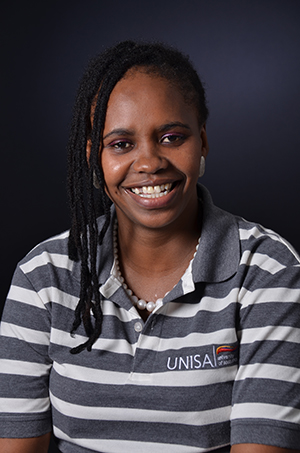News & Events
SRC President, Zandile Sodladla, wants to be a legacy at Unisa
 Where and when were you born?
Where and when were you born?
I come from a big family of eight children. I am the sixth one. I was born in 1980 in the then Transkei, now known as Eastern Cape. I grew up in a rural area. I even did my Matric there. I moved to East London and enrolled with Unisa back in 2011. I started my BA in Social Work and that is when I was introduced to politics. When you enter higher education, your eyes open to what is actually happening. The profession of social work seeks to advocate for those who are vulnerable. I am a passionate person and concerned about the issues that affect the students. I go out of my way to ensure the issues are addressed.
How has this shaped you and your role in the SRC? How has going to university changed your life?
My mother is my role model in how she approaches life. She motivates me to take on challenges head on. I have never seen her complain as a single mother and breadwinner. She is a good listener and motivates us to keep moving forward. This pushed me to succeed in university. My approach is “adapt or die”. It has definitely changed my life. I never thought I would be a South African Student Executive person going into the global sphere. Meeting with international student unions and comparing the way we do things here versus how they do it there. I would advise other students to do it as well. University changes the way you think and how you do things.
What motivated you to take on the role of president of the SRC?
Being a social worker motivated me to be vocal about the issues and social ills. For example, coming to UNISA and finding there is no study space. Yes, Unisa is a distance learning institution so you can study anywhere, even at home but that is not enough. During exam time, we spoke to management about extending the Library open times to allow students to stay on campus longer to prepare for exams.
What are your priorities in this role?
I am the political head of the SRC. Unisa is structured in a similar way to the country. Thus, we have provincial SRC’s and national SRCs. I oversee all the duties of each of the SRCs. It is a challenging role for a female president. Everyone who has this position must know it is a challenge. You do not rest as the president of the SRC. You need to know what is happening with students and with management. You must be informed at all times. If you are ever contacted in the middle of the night with a problem, you need to provide answers.
What opportunities are there for your fellow students to operate on the global stage?
There is a research and innovation department at UNISA that allows students to compete globally. Currently, one of our own students is going abroad for research and innovation. As the SRC, we just returned from Tanzania. We were there to compare what we’re doing in South Africa and what we can learn from others. We also initiated a project there to help the African continent compete internationally in terms of research and guidance to other universities. So globally, there are many opportunities for students to get involved. However, there have been national concerns on the quality and cost of education [e.g. #FeesMustFall].
What are your thoughts on higher education in South Africa? What are your views of its impact on society as well as life on campus?
In my personal view, I have seen #FeesMustFall start long before 2015. When it erupted in 2015, it was a ticking time bomb that was waiting to explode. We want an equally de-colonized education system. Those who were before us wanted, this but we are in a society that is not classless. It speaks to inequalities within the university and society as a whole. We recently had a meeting at a hall in Sunnyside where the hall was full of black children only. No one from any other ethnic group was there to speak up about the quality of education not being relevant to the practical side of things. There needs to be a balance in all things. That is why I am excited that Unisa is trying to transform the curriculum.
On a more personal note, what is your approach to leadership?
That’s easy. A participative approach because I want everyone to be involved. Teamwork is important to make the SRC work together to resolve issues
How would you like your tenure as SRC president to be viewed in 10 years’ time?
What, for you, would success look like?
Well I have a project on my mind that I would like to be a legacy at Unisa. I would like to help students during orientation to help on-board students within each of their colleges to ensure they succeed at their modules.
Publish date: 2017/07/10
